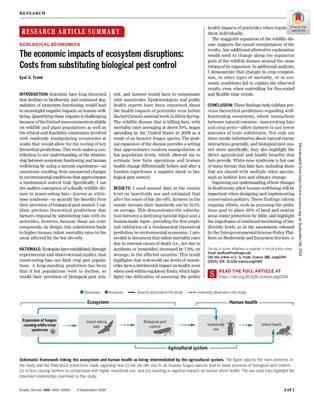The Economic Impacts of Ecosystem Disruptions: Costs from Substituting Biological Pest Control

This work makes a contribution to our understanding of the relationship between ecosystem functioning and human well-being by using a natural experiment—an occurrence resulting from unexpected changes in environmental conditions that approximates a randomized control trial.
Specifically, the author uses the sudden emergence of a deadly wildlife disease in insect-eating bats—known as white-nose syndrome—to quantify the benefits from their provision of biological pest control. I validate previous theoretical predictions that farmers respond by substituting bats with insecticides; however, because those are toxic compounds, by design, this substitution leads to higher human infant mortality rates in the areas affected by the bat die-offs.


